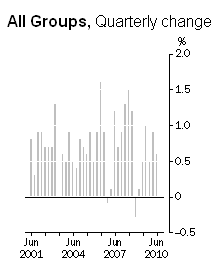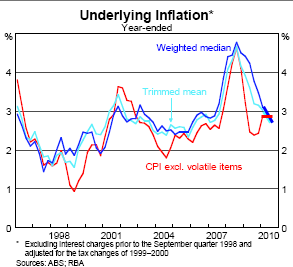One big worry out of the way. At least one thing has gone right for Labor this week. The consumer price index figures released today by the Australian Bureau of Statistics should put an end to any thoughts the Reserve Bank board might have had about putting up interest rates. Inflation by all the measures is on the way down rather than up and safely inside the range the bank has as its policy goal.

The inflation measures the Reserve puts most emphasis on in its deliberations are shown in this chart from its website, which I have updated with today’s ABS numbers.

All three measures are now inside the preferred two to three per cent range.
What about me? Some glorious and delightful examples this morning of the ingratitude and jealousy that can strike a political party when it gets the parish pump working during an election campaign. In a blatant attempt to gain votes in some marginal Brisbane elections, the Prime Minister announced a $1.15 billion grant to fund the long-waited for Redcliffe railway line. So how did the local Courier Mail greet this piece of electoral largesse? With this headline above a churlish story saying that now the state government was going to be slugged $300 million for its share of the project plus, for some reason that is not altogether clear to a casual reader such as me, $8.2 billion for the Cross River rail project.

Just a bit down south the Gold Coast Bulletin was in no mood to give Labor any merit marks. It lamented all over page one the fact that Labor was ignoring the need for the Coolangatta railway extension!

But the best “what about me?” for the day clearly went to the Sydney Daily Telegraph with its front page blast.

Changing opinions of a CIS guest. Niall Ferguson, MA, D.Phil., is the Laurence A. Tisch Professor of History at Harvard University and William Ziegler Professor at Harvard Business School. He is a resident faculty member of the Minda de Gunzburg Center for European Studies. He is also a Senior Research Fellow of Jesus College, Oxford University, and a Senior Fellow of the Hoover Institution, Stanford University. He writes a column for The Financial Times of London and made a television series for the BBC. All-in-all a very important and, perhaps, influential fellow.
He is in Australia at the moment to give a lecture for the Centre of Independent Studies, which probably allows us to put him in the non-Keynesian economists camp. But as people settle down to hear him deliver tonight’s John Bonython Memorial Lecture in Sydney, they might like to consider which particular Niall Ferguson they are listening to, for he is clearly an economic historian capable of more than one viewpoint on the important matters of the day.
Because of his prominence as a pundit — what do we call the likes of him these days, public academics or something — the views of Professor Ferguson attract the attention of his peers and I have been following his contribution to the economic debate, along with the attacks on him, with considerable interest. With the exception perhaps of global warming, there is probably no more important political question at the moment than how the developed Western economies of the United States, Japan and Europe should handle policies affecting growth and government debt.
Earlier this week I noted that J. Bradford DeLong, of the Department of Economics, U.C. Berkeley, wrote on his blog (one that I have on my daily must-read list) that “it would be a mitzvah” if someone took a piece Prof Ferguson wrote for the New York Times on December 12, 2003 headlined “President Both: Bush Can Have Both Guns and Butter, At Least for Now” and compared it with his contribution to The Financial Times of London on July 19, 2010 called “Today’s Keynesians have learnt nothing”. According to DeLong, Prof Ferguson had made a “180-degree intellectual reversal” and someone with more time than he had should cut-and-paste them into “a Niall Ferguson versus Niall Ferguson debate”.
Now, lo-and-behold, Matthew Yglesias and Ryan McNealy have answered the call at their Think Progress website. In this version of a debate, 2003 Ferguson is in boldface, 2010 Ferguson is in italics:
Guns or butter: this is the choice historians conventionally say that governments face. The administration is currently engaged in an audacious — some would say reckless — experiment to disprove this theory. To judge by his actions, the President’s response to the question “Guns or butter?” is: “Thanks, I’ll take both”. This, in short, is the guns and butter presidency.
Are there precedents for such a combination? What’s to say this deficit-spending won’t work? Keynes would tell us that in the current environment we must boost aggregate demand.
Certainly. Long before Keynes was even born, weak governments in countries from Argentina to Venezuela used to experiment with large peace-time deficits to see if there were ways of avoiding hard choices. The experiments invariably ended in one of two ways. Either the foreign lenders got fleeced through default, or the domestic lenders got fleeced through inflation.
But the United States has broken the guns or butter rule before. Under President Ronald Reagan, substantial increases in military spending coincided with comparable increases, relative to gross domestic product, in personal consumption — that proportion of GDP that the public, as opposed to the government, spends. The crucial point, of course, is that in the short term at least, fiscal policy is not a zero-sum game.
But this doesn’t respond to long run inflationary fears. When economies were growing sluggishly, that could be slow in coming. But there invariably came a point when money creation by the central bank triggered an upsurge in inflationary expectations.
But, as Keynes remarked, in the long run we are all dead! Aren’t these “inflationary expectations” priced into the markets?
New York Times columnist Paul Krugman, who likens confidence to an imaginary “fairy” have failed to learn from decades of economic research on expectations. All it takes is one piece of bad news – a credit rating downgrade, for example – to trigger a sell-off.
But this will not be the kind of inflation experienced in the 1970’s and 1980’s. So powerful are the deflationary forces today (notably in the second and third biggest economies, Japan and Germany) that Washington can splurge on its military and social services with only a modest impact on expectations of inflation.
But it is not just inflation that bond investors fear. Foreign holders of US debt — and they account for 47 per cent of the federal debt in public hands — worry about some kind of future default.
But the United States has a unique advantage over all other sovereign borrowers: central banks and other institutions around the world need to hold dollars as the currency most frequently used in international transactions. While this is true, America can count on selling large amounts of dollar assets, like 10-year Treasury bonds, to foreigners — very large amounts.
But for how long? The evidence is very clear from surveys on both sides of the Atlantic. People are nervous of world war-sized deficits when there isn’t a war to justify them. According to a recent poll published in the FT, 45 per cent of Americans “think it likely that their government will be unable to meet its financial commitments within 10 years”. Surveys of business and consumer confidence paint a similar picture of mounting anxiety.
The only imminent danger is that the dollar could slide sharply against Asian currencies, as it has against the euro. But the chief losers then would be the Asians. And those who panicked about the debt under President Reagan failed to see how manageable it was. It’s even more manageable today.
Hogwash. It was said of the Bourbons that they forgot nothing and learned nothing. The same could easily be said of some of today’s latter-day Keynesians!







Unbelievably after todays inflation figure was announced, Hockey the would be treasurer, stated on ABC News 2pm, this result proves Labor has mismanaged the countries economy. I appreciate he would be deeply disappointed there will be no rate rise during the campaign, but to accuse the Govt of mismanagement is too stupid to consider, from someone who aspires to the highest economical office in the land. Time to look for another job Joe, you just don’t have what it takes.
The libs are bereft in their argument that they are the better economic managers, based on the last 27 years in oz anyway, except for the fact that most of the punters still see things through that prism. No amount of rational argument will sway some people, and they will believe what they will believe. Joe is just making a fool of himself to anyone with some knowledge, but to the punter, he speaks the truth.
How did the libs so effectively create this fantasy in the minds of the punters?
Hockey had obviously prepared his speech before the (expected to be bigger) figures came out.
What to do? Just pretend no one would notice of course!
Does Big Joe think he can keep interest rates down by just sitting on them? It would seem so.
This clown is so out of his depth it’s a joke.
That would be the same Niall Ferguson that the Oz was citing yesterday as the authority who claims that the governments GFC stimulus was ineffectual.
Yep, the same one.
I am not on Ferguson’s side in this debate (closer to Martin Wolf of the FT on whose recent blog Brad de Long and Niall Ferguson’s views can be found) but do credit him with coming up with a properly Keynesian response about changing one’s mind when the facts change. A lot has happened in the world economy since 2003 and Bush’s fiscal profligacy had a long way, far too long a way, to run still. A pity that Ferguson at the time didn’t forecast the disaster to flow from the housing-debt bubble which was highlighted in an American Conservative mag article in early 2003, the same mag which forecast with chilling accuracy the disasters that would arise from Bush’s determination to attack Iraq, and the expense of it.
So, in short, I think Ferguson is basically wrong now in his anti-Keynesianism but wouldn’t hold his 2003 views against him on the ground of inconsistency.